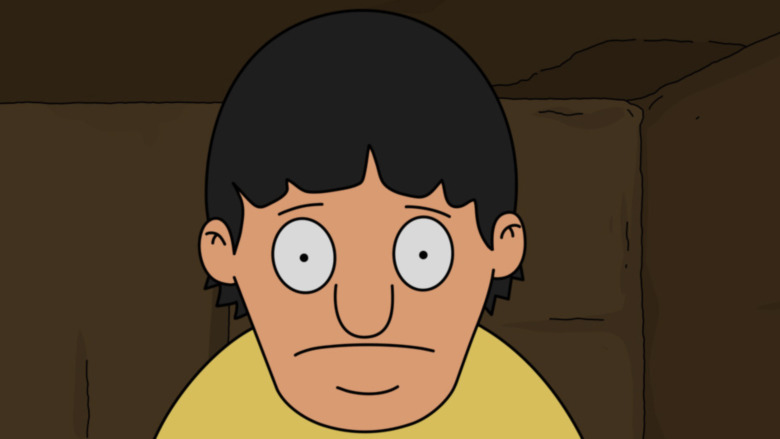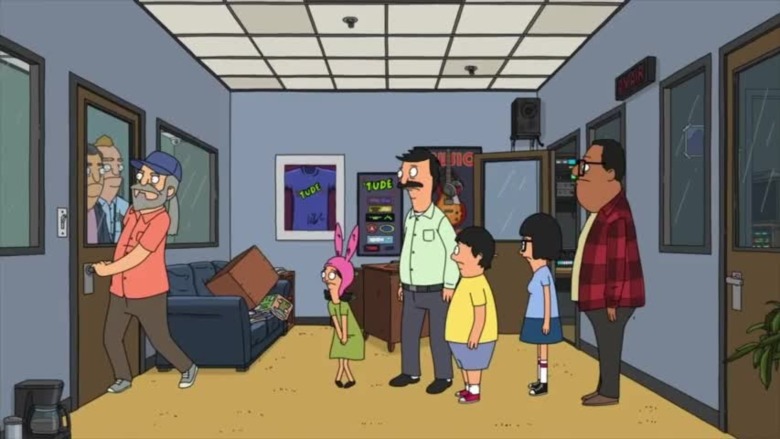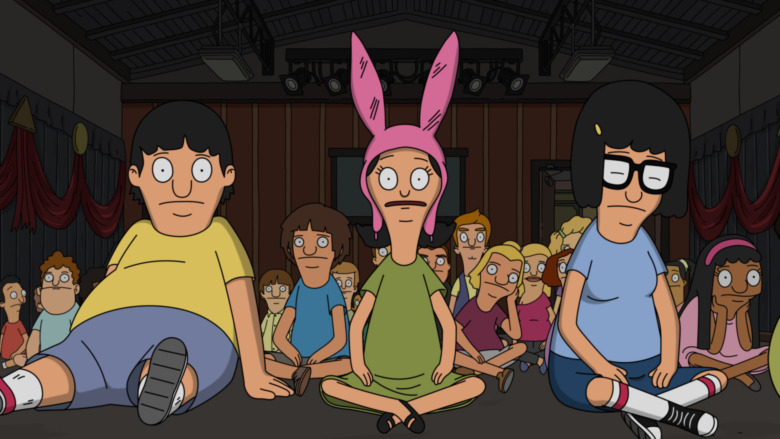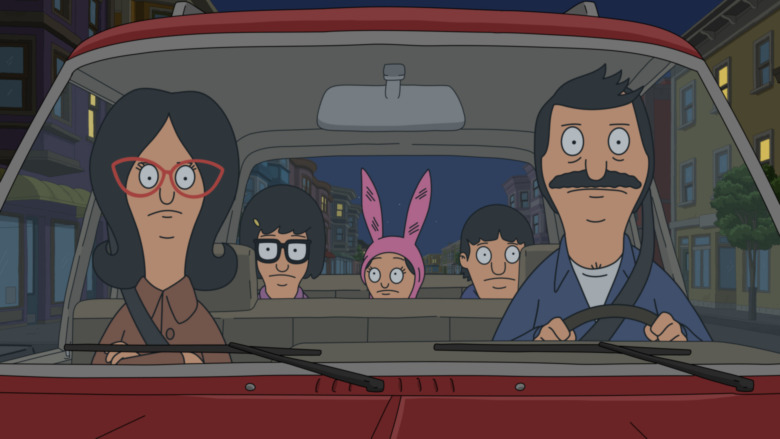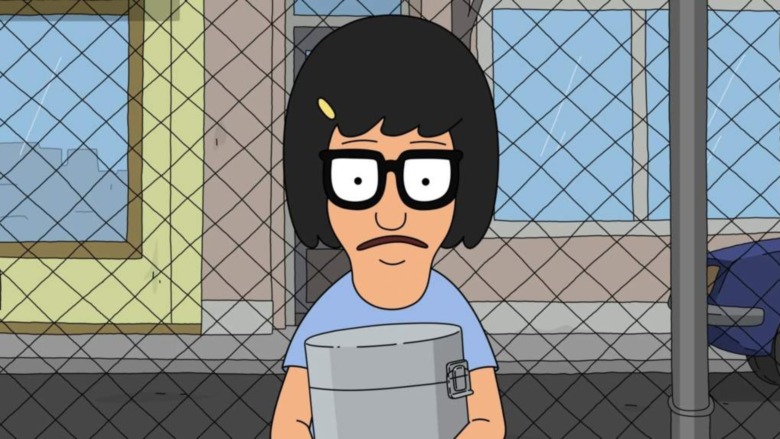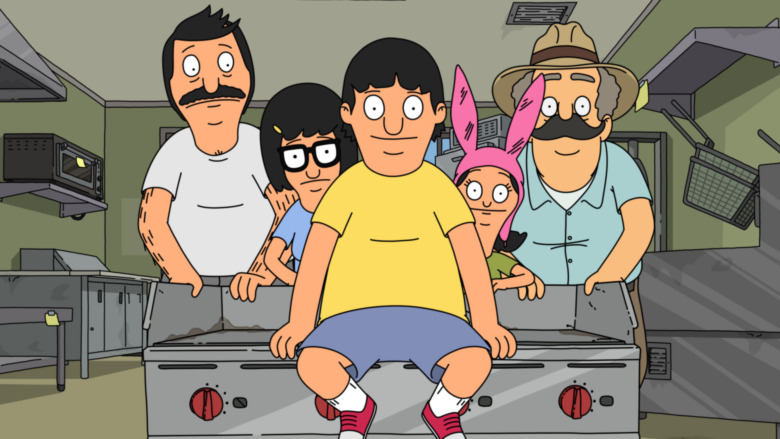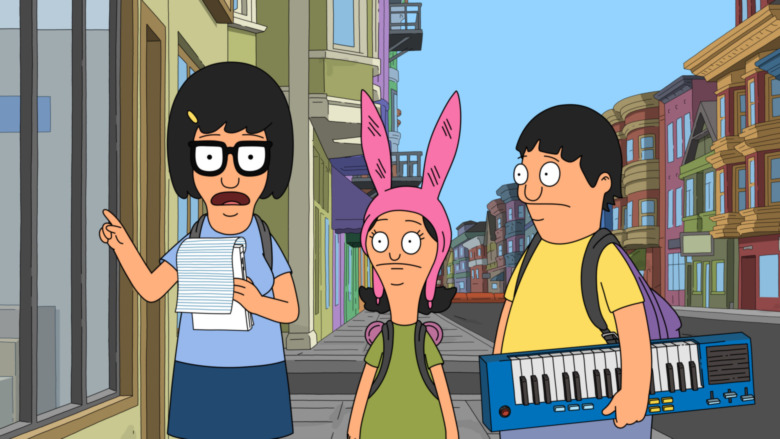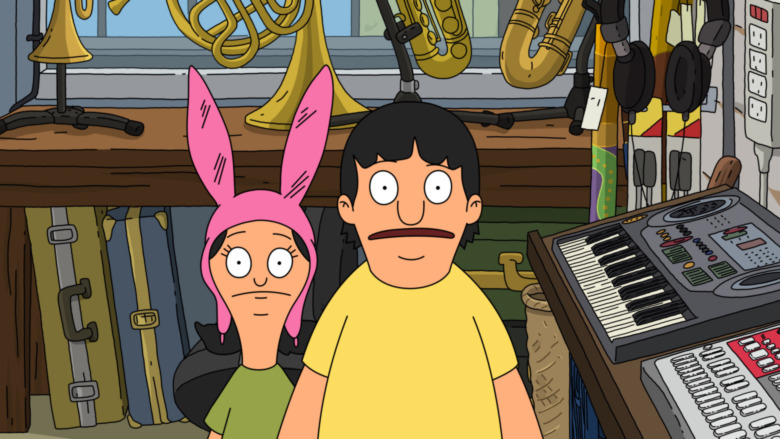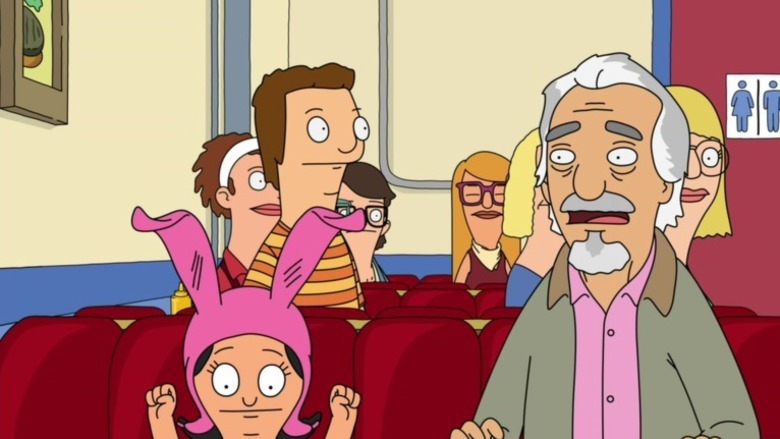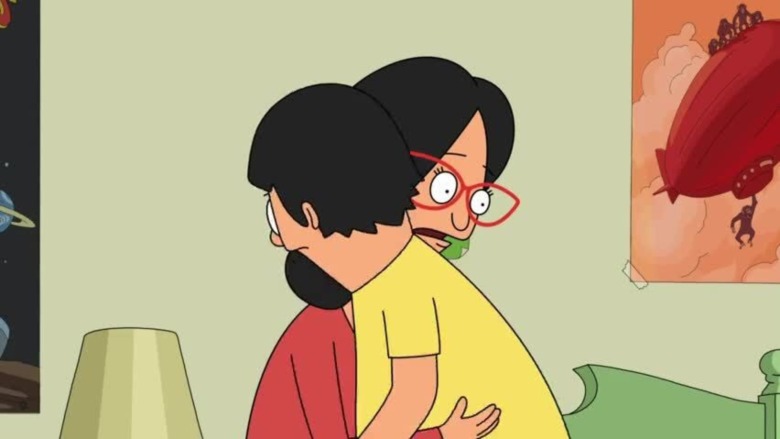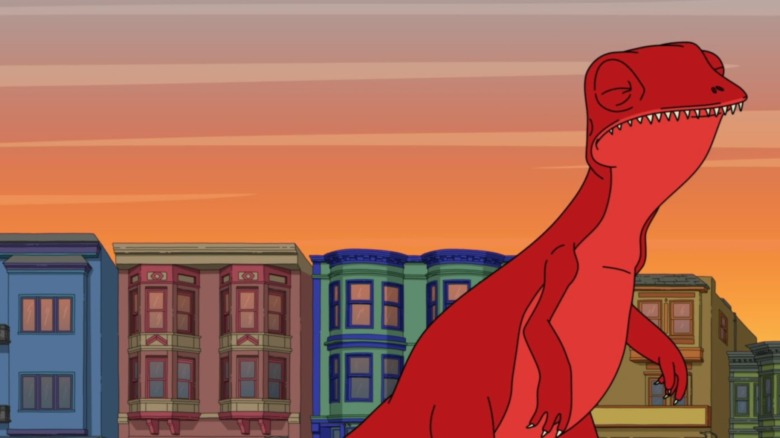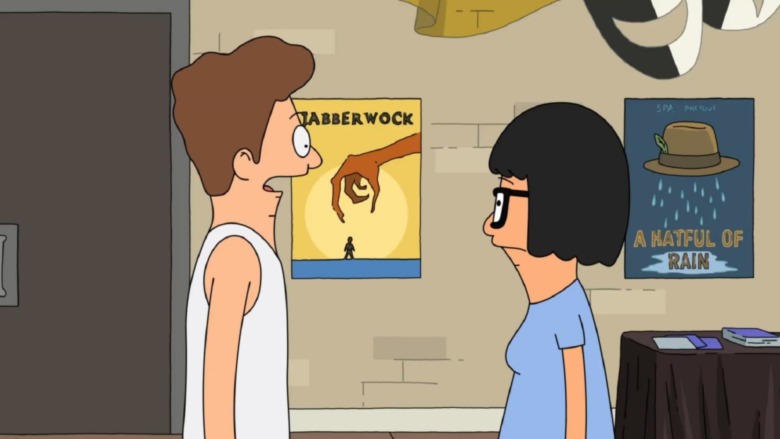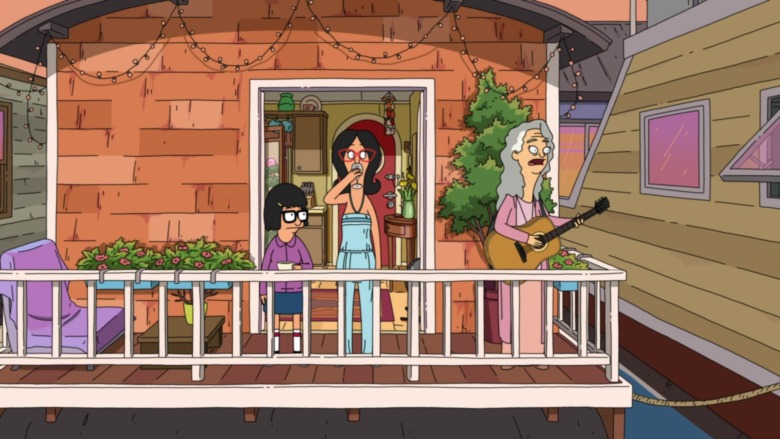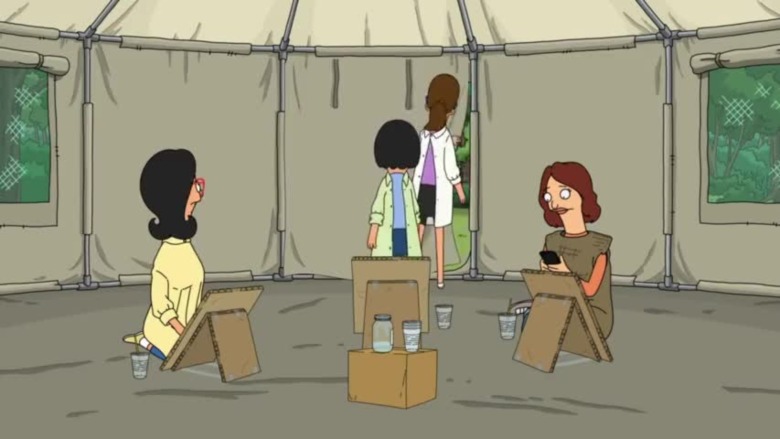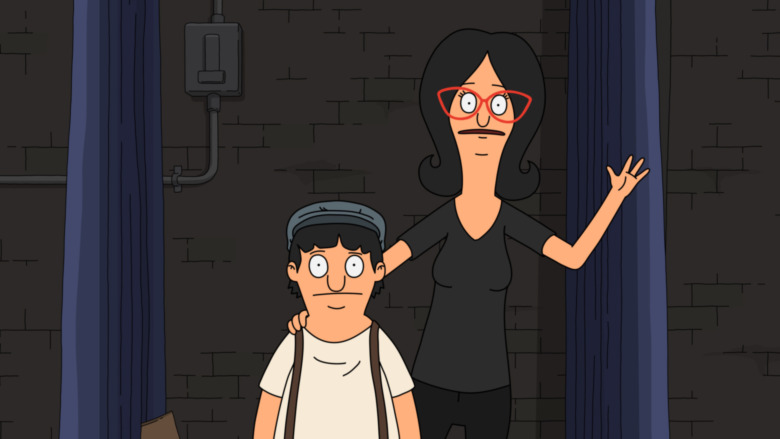The Worst Episodes Of Bob's Burgers
It's hard to beat a pilot episode called "Human Flesh," but that's exactly what "Bob's Burgers" and the Belcher family have done on Fox since 2011. Over the years as we've seen the Belcher family grow up — metaphorically, since the characters seem to remain relatively the same age over the course of the show — the show's union of wholesomeness and crudeness, the combination of mundane and absurd, and various other special ingredients have become increasingly hard to explain and even harder not to love.
We've seen mechanical sharks in the basement taken out by an ice cream machine's selfless sacrifice. We've seen a budding romance between Gene and a manatee puppet. We've seen characters struggle with heavy themes like class and identity in a way many of us might recognize — always with the support of a close-knit and quirky family who can rely on each other no matter what.
So when we say that these are the "worst" episodes of "Bob's Burgers," that's an extremely relative label. The descending IMDB ratings indicate that only three of them even scored below a 7/10. A wacky but inclusive show that has come a long way to appeal to a huge audience, "Bob's Burgers" can count these episodes as "rare" (pun intended) dips in quality.
15. Long Time Listener, First Time Bob
For these IMDb ratings, 7.2 is the cutoff, capping a list of 16 episodes with only 6 episodes scoring a 7.1 or below. Again, it's hard to say there are really "bad" episodes of "Bob's Burgers". But one reason for the low rating of "Long Time Listener, First Time Bob," a Season 9 episode that aired in 2019, might be that it covers an incredibly polarizing topic: sweet potato fries vs. regular.
The "controversy" simply may have turned a number of viewers off to the cleverly delivered premise played up with the star power and unmistakable voice of Nick Offerman. While sometimes Bob can be a bit of a stick-in-the-mud, sometimes sticking to your guns is just as dynamic as taking a more "modern" approach like adding sweet potato fries to your menu. Bob proves this point while making friends with another lovable curmudgeon. Maybe it's not for everyone, but it's lovely to watch.
14. If You Love It So Much, Why Don't You Marionette?
Another Season 9 episode, "If You Love It So Much, Why Don't You Marionette?", finds itself resting at a 7.2 rating as well. This one hits us right in the childhood and somewhat uncomfortably subverts our normal perception of classic "Bob's Burgers" characters. This episode shows us Louise as the 9-year-old she is, and all the vulnerability that comes with that age — vulnerability that's usually masked by her trademark chaotic energy.
In this episode, Louise does what she does best: Get on an adult's bad side, in this case the crotchety manager of a puppet theater. But this time, instead of a fierce triumph after one of her trademark schemes, we actually see Louise get put down by an extremely irksome antagonist.
Sure, maybe she could stand to be told "no" a bit more often — her parents often capitulate to her will out of fear or exhaustion. But what we see in Edith the marionette theater owner is more than just a "worthy adversary" to Louise, which would be entertaining to watch. No, she is a soul-crusher, which by definition requires Louise to admit she has a soul to be crushed and isn't just a hardened mastermind. It's hard to see her vulnerable in the face of adulthood and clinging to elements of her identity as a young child, an identity she much more often prefers to ignore.
13. Bed, Bob, and Beyond
Sensing a trend? The Season 9 episode "Bed, Bob, and Beyond" also sits at a 7.2 audience rating on IMDb. All of the worst-rated episodes are from Season 9 or beyond, in fact, an affliction many long-running shows suffer from. But while some later episodes may not have landed as well with fans as most earlier ones, as a general rule "Bob's Burgers" has stayed "fresh" even as it has aged.
This episode, though, was notably experimental in ways that may have contributed to its lesser popularity. For one thing, it was one of the first and few to feature a pronounced dissonance between Bob and Linda that persisted throughout the entire episode. This is an off-putting occurrence in the Belcher world. For another, this episode had unconventional story structure for the series. It wasn't the first time this happened, but it left some viewers with a sense of discomfort.
While many of the holiday episodes are incredibly popular, this Valentine's Day episode didn't seem to deliver in the same way. In this one, the kids have broken a bed and Bob and Linda are in a fight after missing their movie, so the kids tell a series of convoluted stories in an attempt to both save their own tails and soothe the awkward tension between their parents. Not necessarily the position we like to see the Belcher family in.
12. Fast Time Capsules at Wagstaff School
As the show neared its 200th episode, it showed little sign of slowing down, except perhaps with the Season 11 episode "Fast Time Capsules at Wagstaff School," which was its 199th and only earned a 7.2 rating with audiences. The title, like many in a show chock-full of allusions, is a play on the 1982 film Fast Times at Ridgemont High, which coincidentally shares the same IMDb rating as the episode.
The similarities mostly stop there, unless you want to do some reaching and say that the "coming-of-age" theme of Fast Times relates to the "passage of time" theme of time capsules. In the "Bob's Burgers" episode, we see Tina take on her typical "hall monitor" vibe when she is put in charge of the time capsule project at school.
This is one of the episodes in which Tina is at her most close-minded and stubborn. We can't blame the girl for having high standards, but those high standards can sometimes backfire: If you don't allow anyone to be good enough, you'll be left alone.
11. Flat-Top O' the Morning to Ya
The inaugural St. Patrick's Day-themed episode wasn't quite as lucky as fans and creators of the series may have hoped, with a rating of 7.2. While this episode features the Belcher kids embodying their typical offbeat selves, it misses the boat on developing Bob and the thing that makes him who he is: his identity as a restauranteur.
You'd think the content of this episode, which revolves around helping another restaurant owner after the failure of his own business, would hit closer to home for Bob, but this connection isn't really developed. Instead, Bob falls into his habitual role as a wet blanket. We know that Bob has genuine motivations, fears, and desires, and it's sad to see an open opportunity to explore these things go to waste.
A portion of the episode also features the characters being trapped in a spice closet, which doesn't leave a lot of room (literally and figuratively) for entertainment or plot development.
10. Wag the Song
By the 10th season, the plotlines and character motivations in "Bob's Burgers" had grown increasingly complex. Underpinning them all still, however, is the trademark simplicity and authenticity of the core ensemble — but in general, we've come to expect a bit more of the bizarre from the series this late in its run.
"Wag the Song," though, feels like a return to the uncomplicated, and that may not have landed as well with audiences who have watched the show develop for years. Instead of an elaborate feud between Bob and Jimmy Pesto, for example, the burger restaurant simply has to deal with the very basic threat of the glare from Pesto's new (and impractical) steel awning.
At the center of the children's plot is a song contest, an ill-fated attempt by Mr. Frond to make the students feel involved. Mr. Frond is anything but a favorite character, and his foibles and insecurities can certainly be tiresome in this episode — perhaps why it's only rated it 7.2.
9. Drumforgiven
Another entry from Season 10, and another 7.2 rating, the episode "Drumforgiven" is a story that centers a lot around Gene Belcher. Unfortunately, as you'll see throughout the list and when we get to the lowest-rated episode of all, Gene is as misunderstood with real-world audiences as he sometimes is in his own world of "Bob's Burgers".
Maybe audiences just aren't ready for him — something he himself would probably view as a point of pride. His boisterous, always-on nature isn't for everyone, but that's what makes him special and what makes it so meaningful for him to overcome emotional crises and follow his eccentric dreams. But maybe audiences' relative ambivalence toward this particular episode has nothing to do with Gene and his quest for redemption after he's kicked out of a music store (which would seem to be his natural habitat).
Maybe the plot that's more to blame is Teddy's awkward subplot, in which he desperately and conspicuously tries to hide the fact that he has a contractor job at Jimmy Pesto's, fearing Bob's retaliation and creating uncomfortable situations despite Bob's repeated assertions that he doesn't care and is more bothered by the way Teddy is acting. Audiences could well have been bothered, too.
8. The Hawkening: Look Who's Hawking Now
The relationship between Bob and Louise is one of the best parts of "Bob's Burgers." It's at the same time comedic and deeply meaningful: Both of these characters are rough around the edges in their own way, which provides comic relief when things start to get real, but on the flip side, also makes their vulnerability so much more meaningful when it does show up.
The Season 10 episode "The Hawkening: Look Who's Hawking Now” (rated at 7.2) puts this relationship front and center, but also requires it to share the spotlight. In a way, we experience the characters' feelings, especially Louise's, secondhand versus directly: Her response to the degradation of someone else's father-daughter relationship reveals how close she holds her own.
Perhaps this narrative distance seemed unnecessary — seemingly introducing a random pair of characters, the father-and-daughter stars of a movie Louise and her father had loved, to showcase by proxy the Bob-Louise relationship fans already knew and adored.
7. Motor, She Boat
There's nothing like a good Thundergirls episode of "Bob's Burgers", even one of the lower-rated ones (this one clocks in at a 7.2). While they tend to quickly get out of hand, anyone who's had to deal with any type of young girls' club or clique knows that there is a kernel of truth in each of these over-the-top plotlines.
In "Motor, She Boat," it all comes down to cookies — as it almost always does — but the manipulation and deceit involved in Troop 257's particular scheme this time is taken to quite the extreme. The Thundergirls are more than just a caricature of petty teen and preteen girls: In this episode, they are a terrifyingly manipulative force for evil, and they take advantage of a helpless innocent.
The rating for this episode isn't that bad, so while some audiences may have found the plot unnecessarily convoluted, many viewers clearly appreciated it as a neurotic gem.
6. Mommy Boy
The first episode on our list to dip below a 7.2 (rated 7.1) is the Season 11 episode "Mommy Boy." It shouldn't take too much guesswork, after all the character exposition we've seen over the past decade, to figure out that this episode centers around Gene's relationship with his mother.
Gene is often forced to confront the idea that his parents are not just his parents, but people with lives and interests separate from his own. This can be scary, especially for a kid who finds a lot of security and identity in his relationship with parents. We've noticed already that sometimes the episodes that take a closer look at Gene's more vulnerable side, and the formation of his identity, don't play as well with audiences.
Maybe it's because they expose a vulnerability we have in ourselves. Or maybe audiences just didn't think that Gene getting jealous of his mom's social life was a good look on him. But you have to admit it's in character.
5. The Handyman Can
Remember the Valentine's Day episode "Bed, Bob and Beyond"? One of its unique features was an experimental episode structure that let the Belcher kids run the show. In most of these episodes, each of the kids uses their imagination (often mimicking the storytelling style of a popular film or television show) to tell a hypothetical version of the same series of events.
There are a few episodes like this, and the Season 10 episode "The Handyman Can" (rated 7.1) is one of them. Instead of focusing on the family, though, as these episodes often do, this episode centers on Teddy. The kids' stories, in this context, are their efforts to boost his self esteem after a wiring job on a gazebo ceiling fan went up in flames.
Though their motivations are selfish (if Teddy isn't confident enough to rewire their walk-in, they'll have to pay a professional more than double out of their trampoline park fund), and the premise could be seen as repetitive, it's quite a wholesome effort.
4. Tappy Tappy Tappy Tap Tap Tap
Another Season 10 episode that received a 7.1 rating was "Tappy Tappy Tappy Tap Tap Tap," which centers around — surprise, surprise — tap. Tap-dancing itself is a bit of a niche interest, but the Belcher kids and Tina especially are known and loved for niche interests, so maybe that's not the reason that this episode wasn't as popular as others.
It is admittedly a bit of a familiar set of storylines. Tina becomes obsessed about something. Louise goes to elaborate lengths to avoid doing work. Bob is reluctant about, well, pretty much everything. What was interesting about this episode is that it brought back a side character from a previous time: Josh, the ballet-dancing boy from Season 3. And for once, Tina is not primarily boy-crazy (or butt-crazy, even around a bunch of costumed guys her age): Her obsession with who sabotaged Josh in his rehearsal is pretty organic. Maybe the audience didn't know what to do with that.
3. Local She-Ro
In the Season 10 episode "Local She-Ro," Tina and Linda end up on the trail of a famous but elusive singer. It is the first episode on the list to dip below a 7 rating with a 6.9, apparently not a hit with audiences.
For some fans on Reddit, though, this episode does one underrated but crucial thing right: It continues the show's pattern of developing its more minor characters. Tammy, the "Mean Girl" in Tina's school, would already be classed as a minor character. In any other cartoon, her little minions would be hardly mentionable. They definitely wouldn't develop episode to episode.
But Tammy's friend Jocelyn has become a fan favorite because she is the perfect, realistic balance of follower and individual. She wants to please her peers and is pretty intimidated by Tammy, but she also has her own opinions and wants, and her little comments are underappreciated gems in otherwise lackluster episodes like this one.
2. Yurty Rotten Scoundrels
Aunt Gayle is hosting an exclusive artist's workshop in a yurt. It's hard to imagine what couldn't go wrong in this episode, but a little surprising that fans didn't respond to it as well (with a 6.9 rating) as they have to Gayle's antics in other instances. Linda's slightly estranged and extremely strange sister is certainly in rare form this time, teaching her "students" to paint but not allowing them to actually use real paint, initially demanding that their first strokes be drawn in their own blood.
Maybe her eccentricity was getting a little played out for some viewers by Season 10, especially because most of the characters on the show are already eccentric in much more palatable ways. In general, though, her episodes seem to be far enough in between that she's a welcome diversion whenever she arrives. And with Linda constantly — if sometimes misguidedly — supporting and protecting her, there should be plenty more Gayle (good and bad) to come.
1. All That Gene
Finally, we've arrived at the "worst" "Bob's Burgers" episode, and the only one to receive a 6.8 rating. "All That Gene," again from Season 10, focuses on the mother-son bond between Gene and Linda. This relationship is often showcased from Gene's perspective, from which we get a look at both his own eccentricity and the verging-on-codependent relationship that allows him to feel safe in who he is.
That safety is one of the most wholesome aspects of the show, and it is a main source of the bond between Linda and Gene, who are both doggedly enthusiastic, quirky performer types who refuse to change because of the judgments of others. But Gene's safety and authenticity is threatened in "All That Gene" when the Belcher boy fails an audition and Linda clumsily comes to his rescue. Both Gene and Linda learn that part of not being afraid of who you are is not being afraid of failure — but they take some dysfunctional steps to get to that lesson, perhaps contributing to its low rating among fans.
